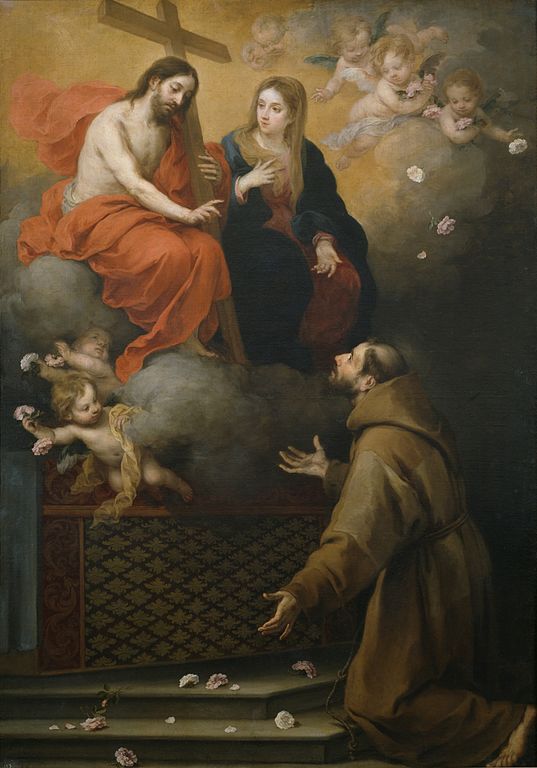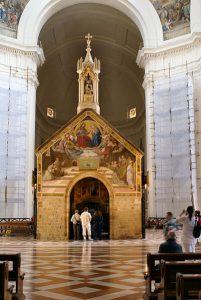Legends abound surrounding the life and times of Francis, the saintly little poor man of Assisi (1182 – 1226): his affinity for all of nature, preaching to the birds, taming the ravenous wolf, recreating the Christmas crèche, receiving the sacred stigmata. What is not so well known is the role Saint Francis played in the bestowal of an amazing gift from a gracious God to His creatures.
Saint Francis was both an itinerant preacher who loved spreading the good news of God’s grace to His people, and a dedicated contemplative, spending countless hours on his knees, communing privately with his beloved Lord.
Anchoring him in periods of time falling between these active and contemplative pursuits was one particular location described by Francis’ biographer Saint Bonaventure as “loved by the holy man above all places in the world.”
The Portiuncula, or “little portion,” was a small plot of land outside Assisi featuring an ancient chapel dedicated to Our Lady of the Angels. The Benedictine Order ceded the “little portion” to Francis, and out of his great devotion to the Mother of Jesus, Francis began the task of renovating the small rundown structure there with his own hands.
Thereafter, the Portiuncula became the site of many momentous events for the new Order of Friars Minor. In its early days, the friars lodged there. There the beautiful, noble Clare put aside worldly wealth for the rough habit of a Poor Lady, inaugurating the Franciscan Second Order of the Poor Clares. The friars held their annual meetings, called chapters, at the Portiuncula, venturing forth to various mission locations. And finally, Francis asked to be carried to this beloved place to spend his final hours on earth.
There is another quite noteworthy event associated with the Portiuncula chapel, one which is commemorated each year on August 2nd. It involves an extraordinary experience – Francis’ vision of Jesus, Our Lady, and hosts of angels.
Omer Englebert devotes a chapter of his biography of Saint Francis to this glorious heavenly visitation, citing its remarkable verbal exchange. “Francis,” said the Lord, “ask of Me whatever you will for the glory of God and the salvation of men.” The dearest longing of Francis’ heart was the salvation of souls. Accordingly, “Lord,” replied the saint, “I pray you by the intercession of the Virgin, Advocate of mankind and present here, to grant an indulgence to all those who visit this church.”
The Catechism of the Catholic Church (1471 – 1473) defines eternal punishment and temporal punishment (consequences of sin) and partial and plenary indulgences for remission of these punishments. The plenary indulgence which Francis obtained from the Lord would remove all punishment of either type under conditions set by the Church as cited below; it can be requested for oneself or on behalf of a soul in purgatory.
With Our Lady’s silent acquiescence, Jesus directed Francis to seek the Holy Father’s permission to promulgate the indulgence, a full pardon of all punishment due to sin which had been confessed and absolved. The day after the vision, Francis set off for Perugia, where the Holy Father, the newly elected Pope Honorius III, resided at the time.
Francis described for Pope Honorius the extraordinary circumstances surrounding the vision; Jesus Himself had granted permission for a full indulgence to the faithful who would visit the church at the Portiuncula on the day of its dedication provided they had first confessed their sins and received absolution. No monetary offering, customary for indulgences at the time, would be required.
Aware of Francis’ holiness and closeness to Jesus, Pope Honorius overcame his initial hesitation and granted verbal permission, to the great dismay of his cardinal advisors. In deference to his counselors, the Holy Father restricted the indulgence to only the day of dedication of the chapel, and afterward, once yearly, on its anniversary.
August 2nd was dedication day for the chapel of Our Lady of the Angels. Francis preached the sermon before seven bishops and a crowd of faithful worshipers, proclaiming his “desire to send you all to Paradise” by the remission of sins. Thus was initiated the Portiuncula Indulgence, otherwise known as the Pardon of Assisi.
Word of this indulgence spread quickly among the faithful, and pilgrims flocked to Our Lady of the Angels in great numbers as each anniversary of the dedication came around.
Centuries later, the Portiuncula chapel of Our Lady of the Angels was enclosed within the Basilica of Saint Mary of the Angels near Assisi. Over time, conditions were amended to make the indulgence accessible to more of the faithful; for example, by a visit to the chapel on any day. Later, any Franciscan church anywhere in the world could be visited on August 2nd for the plenary indulgence to be granted, with the usual conditions fulfilled on that day or within several days before or after.
Those usual conditions are: reception of the Sacrament of Penance with absolution (thus being in the state of grace), reception of Holy Communion, prayers for the intentions of the Holy Father, and a sincere intention of detachment from all sin, even venial sin. Happily for the faithful, the Portiuncula indulgence eventually was extended to fulfillment of these conditions at any parish church.
Saint Francis could not have foreseen how many souls down through the centuries would be impacted by his heart’s deep desire for their salvation. To this day, the Portiuncula indulgence – the Pardon of Assisi – remains his gift to those who share his faith in the Savior he loved so intensely.
© All Rights Reserved, Living His Life Abundantly®/Women of Grace® http://www.womenofgrace.com


